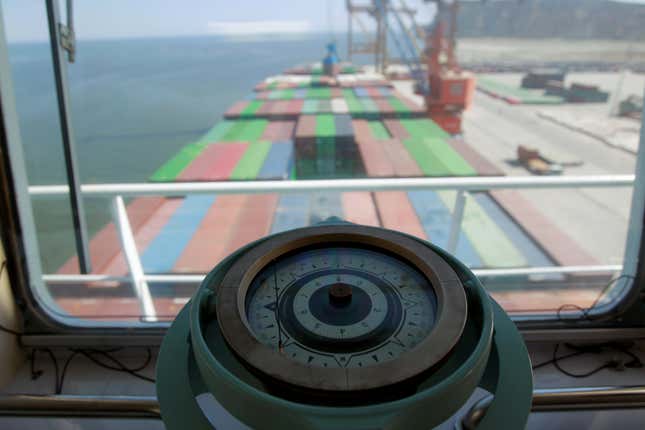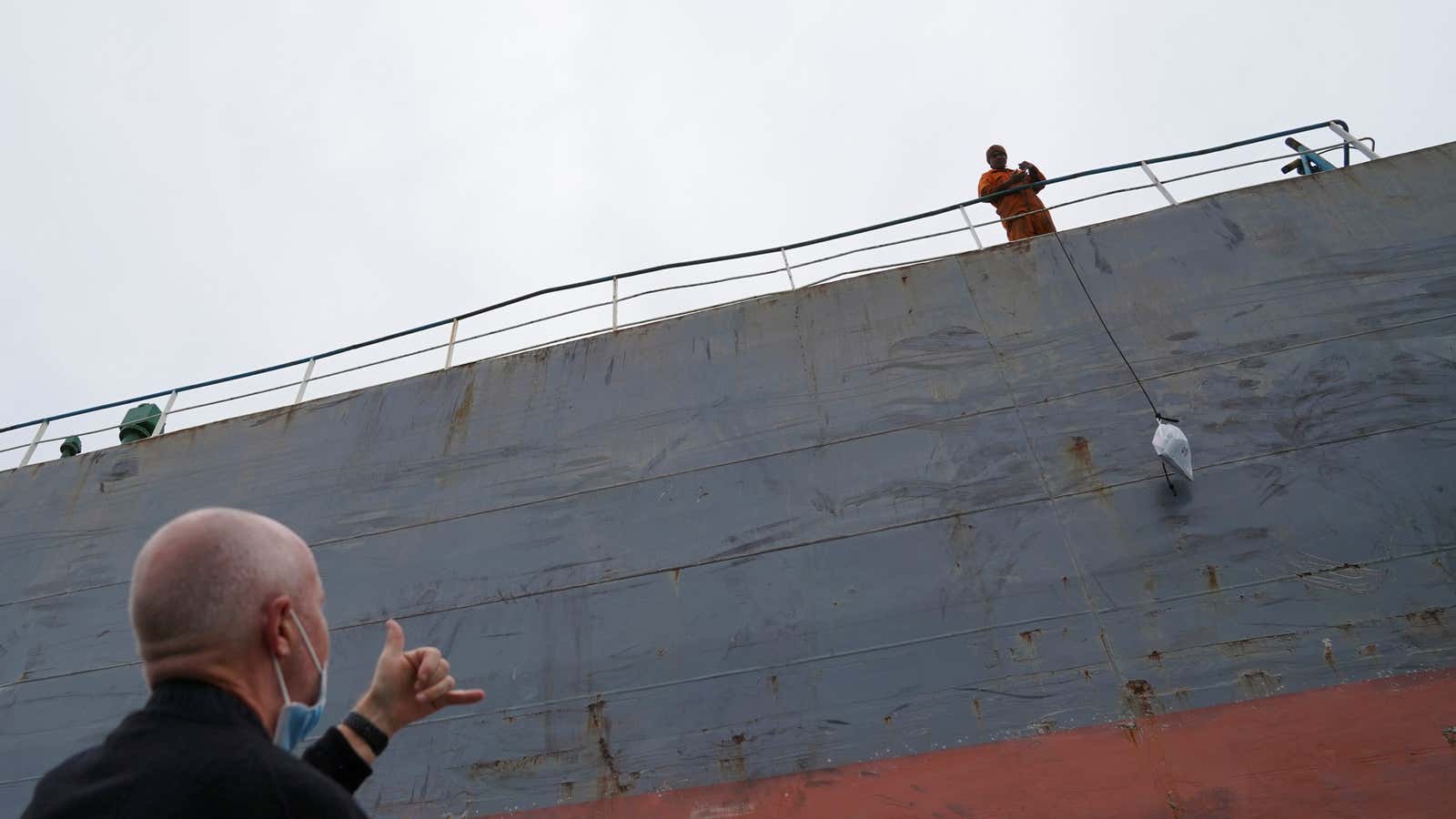When the Covid vaccine became available in Smrutiranjan Nanda’s home state of Odisha, in India, he took it, getting the first shot in March, and the second in April. It was a relief. India was in the midst of a brutal wave of the virus fueled by the Delta variant, and he had lost his mother to Covid. He did not want to be infected.
But by the next month, his assessment had shifted. “I made a very big mistake,” Nanda said.
Nanda, 49, is a second officer on container ships with a career spanning two decades. He had been inoculated with the India-produced Covaxin. In May, he found out that the World Health Organization had not approved Covaxin, which meant that in the eyes of border authorities, Nanda was functionally unvaccinated. His company canceled his assignment to board a ship.
Seafarers cross borders for a living in order to do their work on cargo ships, but they are tied to the vaccine constraints of the countries they come from. This has left many of them caught in the patchwork of policies and jumbled requirements of a world unwinding its pandemic-era border restrictions with limited coordination between governments and international bodies.
While some seafarers cannot get onboard, others are stuck at sea. Since the pandemic started in March last year, seafarers have not been allowed to step foot in most countries. They have not had shore leave and several hundred thousand have had difficulty disembarking at the end of their contracts, resulting in many seafarers being trapped on their ships for a year or more during the height of the pandemic.
Though there have been improvements in recents months, Guy Platten, secretary general of the International Chamber of Shipping, a trade body that represents ship owners, said, “It’s a very mixed picture.”
The conditions onboard are stressful, even maddening, and seafarers are doing their jobs amid a gold rush in shipping, as economies recover with a buying spree so massive, it’s broken the global supply chain. A clear vaccination program could be a pathway to ease the strains of a tough couple of years, but governments have not come together to make that happen.
“This pandemic has highlighted how necessary transport workers are, including seafarers. They need to be treated with a lot more dignity and humanity by society,” said Platten. Instead, “they’ve been treated appallingly.”
Not enough vaccines for some, too many for others
The vaccine challenges facing seafarers reflect broader global vaccine inequality, as well as continued confusion around the validity and efficacy of certain vaccines. So far, WHO approvals for Covaxin and Sputnik are pending as the organization waits for more data from their makers, though a decision on whether Covaxin will be approved is expected soon.
While some countries like the United Arab Emirates, Spain, and Canada have adult vaccination rates approaching 80% or 90%, only about 36% of the world has been fully vaccinated so far. The countries where the bulk of seafarers originate from have even lower levels: India has vaccinated 22% of its population, the Philippines, 25%, and Bangladesh, 11%. Other seafaring nations, like Russia and the Ukraine, use Sputnik, which isn’t WHO-approved, or aren’t administering them, like Myanmar, which is in the midst of a civil war.
Some seafarers have been able to get vaccinated in countries with surplus vaccines and a policy that allows non-nationals to take them, like the US, UK, and the Netherlands. But not every seafarer calls into those ports. Some shipping companies are procuring vaccines for their seafarers, but this is limited to countries where the government allows private companies to buy vaccines in the open market.
Platten estimates that about 30% of seafarers are now vaccinated, a number that’s improving steadily as more vaccines become available.
Seafarers who travel from port to port and disembark in random countries before flying home bump up against the many different rules around what countries consider to be legitimate vaccines for entry. This has resulted in some seafarers getting vaccinated four or six times in order to comply. This is an outcome Platten describes as “wrong, both physiologically and just a sheer waste of vaccines.”
At a German port, the International Transport Workers’ Federation, a union, surveyed seafarers’ attitudes towards vaccination and found that some Ukrainian and Russian seafarers were deeply skeptical of vaccines not made in Russia. That means that as long as Sputnik isn’t approved by the WHO, they will have problems crossing borders.
Smrutiranjan Nanda, who was vaccinated with India’s Covaxin, doesn’t want to double up on another vaccine brand until the practice is deemed safe and approved by the WHO.

What happens to seafarers who don’t have the right vaccines?
Some seafarers have had their jobs rescinded for not having vaccines, putting them in financial strain. Others are enduring multiple quarantines on land and repeated testing, or are finding ways around the governments who won’t accept their nationality or vaccine brand.
Without vaccines, seafarers are vulnerable to Covid. Even if they are not allowed to disembark, they come into contact with stevedores and harbor pilots who board the ships at port. An infection can spread quickly in the close quarters of a ship.
There is no collected data on the number of seafarers who have been sickened on died onboard, but a compilation by Bloomberg from media reports found that more than a dozen ships have had outbreaks. Infections have also caused a temporary closure of ports. In August, China partially shut down the world’s third biggest container port for two weeks after a dockworker tested positive for Covid. The disruption took several weeks to clear at the height of retail stockpiling season.
What does this mean for the supply chain?
Border restrictions have bred terrible working conditions for most seafarers. Many have endured extreme loneliness and lack of access to medical attention. Some have committed suicide. To illustrate the challenges facing these workers, Platten described the case of a ship captain who died of natural causes while onboard. Twelve countries refused to allow his body ashore to be repatriated, an indignity upsetting to his family on land, and disturbing for the crew, Platten says. The captain’s body had to be stored in the mess refrigerator. For five months, the crew had to contend with the unsettling presence of the bagged corpse of their former captain, and the thought that they might be subjected to something similar.
The accumulation of stories like this, and the ongoing limitations on shore leave and unpredictable border restrictions, has made retention and recruitment a problem, Platten explained, especially during the holiday season. The holidays are a staffing challenge most years, and has been further exacerbated by the pandemic.
Some seafarers are opting not to work if there’s no guarantee they can disembark a ship in time to see their families for Christmas. A ship can’t sail without a full crew, Platten explained, which has added delays as shipping companies scramble to man their vessels, compounding the snarls of the supply chain.
What are the solutions?
That this has dragged on for the entire 20 months of the pandemic and counting might suggest that this is an unsolvable crisis. But Platten says the problem is a lack of political will rather than a lack of potential solutions.
ICS is calling for seafarers to be designated essential workers and allowed to cross borders, regardless of vaccination status (though with the strict health protocols that is routine on commercial cargo fleets). It is also calling for a globally approved vaccine passport for seafarers.
The ITF is also campaigning to waive intellectual property rights on Pfizer/BioNTech and Moderna vaccines so more countries in the global south can produce the vaccines and inoculate their populations. More than a hundred countries, including the US back the waiver, while Norway, the UK, the EU and Switzerland, which host the headquarters of major pharmaceutical companies, are in opposition, leading to a deadlock at the World Trade Organization.
“It’s schizophrenic that these three countries and the EU are blocking universal access to vaccines and lifesaving tech whilst simultaneously claiming to be solving the supply chain crisis,” Stephen Cotton, general secretary of the ITF, said in a statement.
“If everyone just took on the task of vaccinating a portion of the world’s seafarers, we would get there,” Cotton said. The vaccine issue “is a problem where we really need some coordination.”
Governments need to get involved, he said, rallying health officials, maritime officials, and border officials, to find a global approach to vaccinating seafarers and recognizing vaccines administered by other countries.
“Right now, it’s a ridiculous situation,” Cotton said. “Seafarers shouldn’t need six vaccines in order to get home to see their families.”
